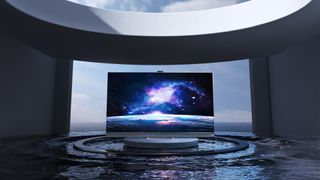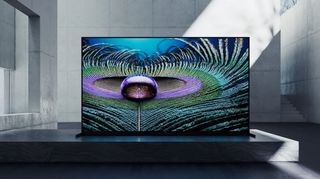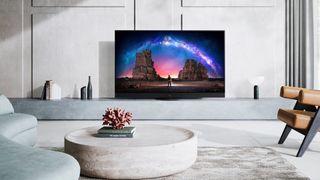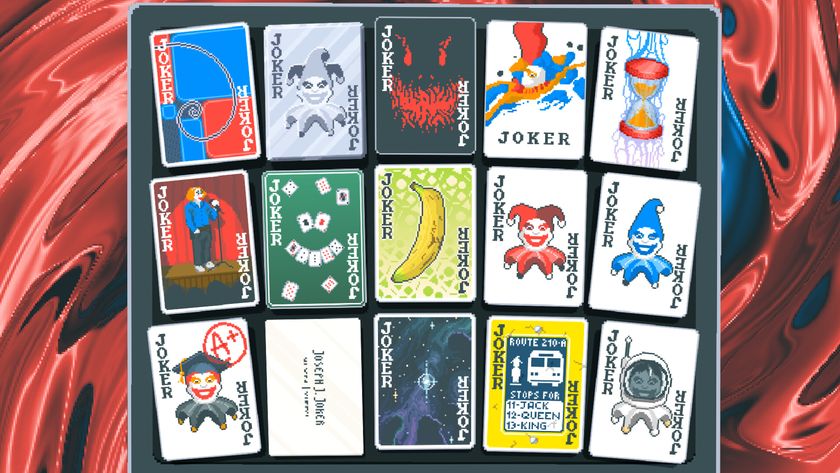
Gaming finally ousted movies as the primary driver for new TV features at CES 2021. The show, which normally takes place in Las Vegas, went virtual this year, so there was no opportunity to get touchy-feely with any of the screens, but there’s no doubt that all the major TV makers are keen to cater to gamers, and not just console devotees either.
With the more generous provision of HDMI 2.1 inputs, High Frame Rate HDMI - with VRR (Variable Refresh Rate) and ALLM (Auto Low Latency Mode) - support is fast becoming commonplace on the new line of TVs.
But the biggest TV brands, notably Samsung and LG, are going even further to win us over, including introducing a whole new LCD display technology, called Mini LED, offering greater picture precision and contrast. 2021 could well be the best year yet to upgrade your telly with some of these models potentially becoming contenders for places in our best gaming TV and best TV for PS5 and Xbox Series X guides.
Given CES is more of a technology showcase than a product launchpad, we don’t have much in the way of model numbers or prices just yet, but there’s still plenty to excite. Here’s what you can expect from the brands leading the way with next-gen TVs over the coming months...

Samsung QLED & Neo QLED TVs for 2021 - world’s first ultra-wide aspect ratio display
Reasons to buy
Reasons to avoid
Samsung is making some big changes to its QLED 4K and 8K TV line-up in 2021, not least by offering top of the range NEO QLED models that use Mini LED backlighting.
Samsung has long led the field when it comes to low input lag. It’s also tuned its picture engine to suit gamers, with Dynamic Black EQ which dramatically improves visibility in dark scenes. Expect also to see support for Freesync Premium Pro and G-Sync compatibility on all its higher-end QLED models. While we're on the subject, be sure to check out our guide to the best G-Sync compatible gaming monitors.
The big news from Samsung for 2021, though, is the world's first Ultra Wide gaming TVs, able to present an extreme widescreen image, be it 21 x 9 or even 32 x 9. This offers gamers a field of view that’s much wider than the average gaming monitor - by way of comparison, the largest 32 x 9 gaming monitor is 49 inches; a 65 inch Samsung QLED TV with a 32 x 9 ratio letterbox is 59 inches.
Sign up to the 12DOVE Newsletter
Weekly digests, tales from the communities you love, and more
A wider field of view means you won’t miss any action and collectible hunting will be easier too. What’s more, you can manually adjust the position of the widescreen image, to match your eye level.
Also new for 2021 is an entirely new Game Bar UI, which provides quick access to settings from the moment that game loads. This game bar will automatically show critical aspects of play, allowing you to quickly switch aspect ratios, check input lag, or connect a gaming headset.

LG C1 OLED and Mini LED QNED - built for gaming
Reasons to buy
Reasons to avoid
LG was the only OLED brand in town for gamers in 2020, it’s CX series screens the first to combine HDMI 2.1 functionality, including 4K 120 fps High Frame Rate Support, VRR, and ALLM with the widest possible range of screen sizes.
And we can expect more of the same on its 2021 models. The brand’s incoming C1 OLED series will range from a 48-incher up to a 83-inches - a new screen size from the brand.
All 2021 LG OLED TVs are G-SYNC compatible, have FreeSync Premium support, and have variable refresh rate (VRR), enhanced audio return channel (eARC), and automatic low latency mode (ALLM). The sets will also sport a new intelligent picture processor, the Alpha 9 Gen 4 AI.
The LG TVs gamers should look out for are its first QNED Mini LED models, specifically the QNED99 and QNED95.
The biggest surprise from LG though was the announcement that Google Stadia is coming to its screens. LG will be the first TV manufacturer to natively support Stadia gameplay via its new smart platform. Games will stream in 4K 60fps with full 5.1 surround sound, if you subscribe to Stadia Pro. That means NBA 2K21, Assassin’s Creed: Valhalla, and Watch Dogs: Legion can be played with a Stadia controller with no additional hardware or game downloads required.
Google Stadia on LG screens will land during the second half of 2021, in the form of a downloadable app from the LG Content Store.

TCL OD Zero Mini LED to elevate gaming standards
Reasons to buy
Reasons to avoid
TCL is another brand that intends to major in Mini LED technology during 2021, saying these screens will ‘elevate video gaming standards to the next level,’ so we can assume high frame rate 120fps support coupled to low input lag at the very least.
TCL has also taken the wraps off its OD Zero Mini-LED technology TVs, distinguished by their ultra-slim profile. OD Zero is a reference to the optical distance between the Mini-LED backlight layer and the LCD display layer, which has been reduced to 0mm, thereby creating an ultra-thin high-performance backlight module.
Given that TCL has a reputation for value for money, it’s fair to assume that what has been an expensive investment for console enthusiasts is about to become a lot more mainstream. A full range announcement is expected in the spring. Color us excited...

Sony Bravia - combining Cognitive Intelligence XR with high frame rates
Reasons to buy
Reasons to avoid
You might think that Sony, of all brands, would be setting the pace in the games TV market, but the company struggled to produce relevant screens throughout 2020. Despite rolling out an ad campaign proclaiming that its sets were PlayStation Ready, most were ill-equipped to make the most of its own PS5.
It’s a situation it hopes to address this year and used CES 2021 to preview a new range of 4K flatscreens with Cognitive Intelligence, an upgraded AI processing engine designed to create more lifelike imagery.
This Cognitive Intelligence XR processor will be found on the brand’s Bravia XR televisions, led by the Master Series Z9J 8K LED and A90J and A80J OLEDs, as well as the X95J and X90J 4K LED TVs.
The key point for gamers though is that this comes hand in glove with HDMI 2.1 support, offering 4K 120fps, Variable Refresh Rate (VRR), and Auto Low Latency Mode (ALLM). The sets will also sport X-Anti Reflection technology, to minimize reflections, for greater clarity, handy for those daytime gaming sessions.

Panasonic JZ2000 - welcome to Gaming Extreme
Reasons to buy
Reasons to avoid
Coming in 65 and 55-inch sizes, the JZ2000 will be Panasonic’s new flagship OLED TV for 2021. The brand has an enviable reputation in home cinema circles, but has been trailing the pack when it comes to gaming support. But that changes here.
The new screen features game-centric features, enhanced audio, and an ultra-low input lag. A new HCX Pro AI Processor has allowed engineers to drive down image lag to just 14ms, using the new Game Mode Extreme, which is a big improvement over past models.
The TV is the first from the brand to offer HDMI 2.1 features like variable refresh rate (VRR) and high frame rate (HFR) 120fps. We won’t get a full spec confirmation for a couple of months, so Panasonic isn’t confirming if the TV is 2K 120fps or 4K 120fps, but let’s be optimistic.
The JZ2000 should also sound awesome, particularly with Dolby Atmos encoded games on the Xbox Series X. The set sports a 360° Soundscape Pro system, adding side-firing speakers to its height drivers and front-facing soundbar. It won’t be cheap, but it will be good!
We're certainly excited to see what these new gaming TVs will look like on the new consoles from Microsoft and Sony, but if you've yet to pick on up, take a look at our guides on where to buy PS5 and where to buy Xbox Series X.
If you're looking for an audio upgrade, we have some great recommendations for you in our guides to the best PS5 headsets and best Xbox Series X headsets.
Looking to pick up a new TV sooner rather than later? Then this is a great time to do so as new TVs usually mean the older line get big discounts. We've rounded up the latest offers with models well suited to gamers, sports, and movie fans alike in our best Super Bowl TV deals roundup. You can also browse the latest offers at these stores:
Steve May is a home entertainment technology specialist. Creator of Home Cinema Choice magazine, Steve writes about gadgets and gizmos for GamesRadar, T3, Louder Sound, TechRadar, Home Cinema Choice and Yahoo. He’s also the editor of The Luxe Review and Pro AV site Inside CI. Steve once wrote a games column for legendary British comic 2000AD (and has a badge to prove it), and maintains that when it comes to top shooters, Doom is the GOAT.
















